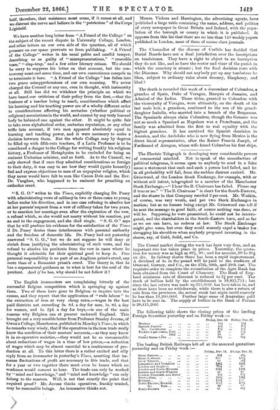We have another long letter from " A Friend of
the College " on the subject of the recent dispute in University College, London, and other letters on our own aide of the question, all of which pressure on our space prevents us from publishing. " A Friend of the College" writes in 'his usual polite and candid temper, describing us as guilty of " misrepresentations," " crocodile team," " clap-trap," and a few other literary crimes. We should be sorry to suppress his letter on that account, but the con- troversy must end some time, and our own convenience compels us to terminate it here. " A Friend of the College " has fallen into two grave misapprehensions of our own meaning. We never charged the Council or any one, even in thought, with insincerity at all. Still less did we withdraw the principle on which we have based our criticism of their -policy from the first,—that the business of a teacher being to teach; considerations which affect his learning and his teaching power are of a wholly different order to considerations affecting his sectarian (whether political or religious) associations in the world, and cannot by any truly learned body be balanced one against the other. It might be Trite fair to take even alphabetical order, sectarian reputation, or any other trifle into account, if two men appeared absolutely equal in learning and teaching power, and it were necessary to make a decision between them. But the whole College may by degrees be filled up with fifth-rate teachers, if a Latin Professor is to be considered a danger to the College for writing frankly his religious history, a Professor of Metaphysics to be excluded for .being an eminent Unitarian minister, and so forth. As to the Council, we only showed that if once they admitted considerations so foreign to their duty, it was easy to see how they would (quite honestly) feel and express objections to men of an unpopular religion, which they never would have felt to men like Canon Dale and the Rev. Dr. Vaughan, who happened to be eminent for preaching an 'orthodox creed.


































 Previous page
Previous page